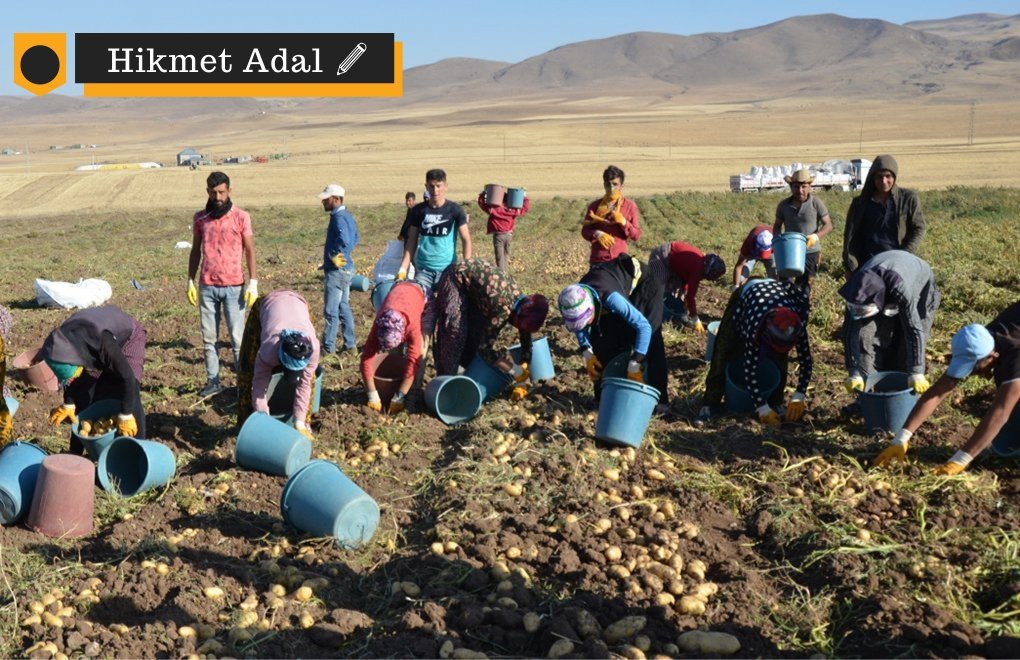Photo: AA
Click to read the article in Turkish
Agricultural workers are one of the poorest groups in Turkey. Living in small and crowded tents, they are now facing Covid-19 risk because of limited access to hygiene and healthcare.
The Development Workshop, a group of experts in social sciences, forestry and biology, has released a report on the effects of the pandemic on seasonal agricultural workers and their children and the measures taken by government agencies.
Ertan Karabıyık from the group says there are three types of agricultural workers: Families doing agriculture, local agricultural workers and migratory agricultural workers. Migratory workers are having a difficult time due to the Covid-19 pandemic, he says.
"The time for migration for seasonal agricultural workers is approaching," Karabıyık says, informing that 300 to 500 thousand workers usually migrate with their families. However, it is not clear whether those younger than 18 and older than 65 will be able to join their families in migration this year because of the curfew imposed on people in those ages due to the pandemic.
"We know that the Ministry of Agriculture and Forestry is working on a new circular but there has been no information on the details yet. Participatory planning is needed for the migration of this many people. Farmers and agricultural intermediaries should be supported. Similarly, measures should be taken for agricultural workers."
"Agricultural production may be interrupted"
"The state must take steps to avoid increasing contamination, especially in rural areas. Because if the number of quarantine zones increases in rural areas, agricultural production will be interrupted."
So far, the government has not managed the situation well, according to Karabıyık. "The extent of the troubles to be experienced and the situation that will emerge will be related to how strict measures the state takes."
"We are talking about the people who make up the poorest section of the country. These people are struggling with hunger, but on the other hand, they are thinking about their health, and face a dilemma about whether to go to the field," Karabıyık says, suggesting that the government should provide funds for them as it did for industrial and service sectors.
Another disadvantage of the migratory workers is that they live in tents, where health conditions are poor and it is not possible to maintain the 1.5-meter social distance, Karabıyık notes. He says the Red Crescent or the Disaster and Emergency Management Presidency (AFAD) should provide them with tents to reduce the number of people staying in one tent.
Child workers
Although the minimum working age for seasonal agricultural workers is 18, there is child labor in the sector, Karabıyık notes.
"Now, children are at risk as much as adults. What needs to be done at this point is to prevent Covid-19 from spreading to tent areas," he says, adding that they will resume their fight against child labor once the epidemic is over.
What should be done for workers?
To protect migratory workers from the disease, Karabıyık suggests a series of measures:
- Intermediaries should apply to provincial branches of the Turkish Employment Agency to receive documents.
- Intermediaries should inform workers regarding the issue.
- Intermediaries should apply to provincial travel committees and obtain necessary documents for workers.
- Intermediaries should adjust the vehicles for workers according to the conditions of pandemic and use half the capacity of vehicles.
- Workers should be informed about where they will go, with which vehicles and with how many people.
- Intermediaries should make vehicles hygienic.
- The province where the workers will go should be informed about the number of workers.
- Distance between workers' tents should be adjusted according to the pandemic and gaps should be left between them.
- Social distance should be maintained in tents.
- Basic hygiene conditions should be provided by the provincial directorates of agriculture or municipalities.
- In the field, social distance should be maintained, it should be ensured that workers don't drink water from the same glass and hygienic solutions must be found for toilet needs. (HA/VK)


